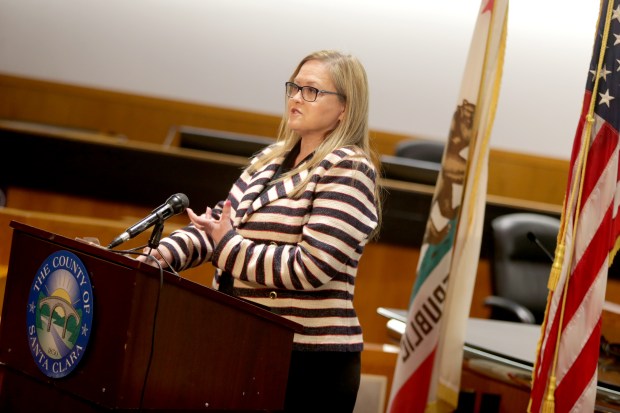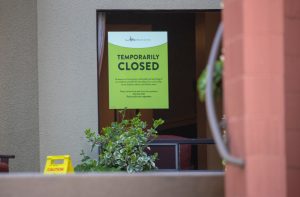For the first time in her five decades of life, Elda Gorostieta is terrified to go to the grocery store. She suited up Tuesday with gloves and a homemade mask stitched from a baby’s blanket to brave her first trip in three weeks to a San Jose Safeway.
Neither sneeze guards, nor social-distancing tape, nor extra precautionary disinfecting of shopping carts are enough to comfort shoppers as the deadly coronavirus spreads invisibly through the Bay Area.
But on Tuesday, Bay Area health officials stepped up requirements for grocers and other essential businesses allowed to stay open, banning reusable bags, prohibiting self-service and bulk foods, requiring hand sanitizer be stocked at checkouts and other key points, and mandating protocols to keep customers at least 6-feet apart.
“I feel really scared, I’m anxious,” said Gorostieta, 54, who brought her 18-year-old daughter, who is in prime health, to pick out the groceries so she wouldn’t have to touch anything herself. “We don’t know what we’re fighting with. We don’t know where the virus is.
“Is it in the air, at the register?”
Bay Area health officials on Tuesday called on stores to post new protocols by Friday, with suggested measures that include limiting the number of customers in a store and even per-person limits on high-demand items such as toilet paper.
SAN JOSE, CA – MARCH 31: Santa Clara County Executive Dr. Jeff Smith speaks during a news conference in San Jose, Calif., on Tuesday, March 31, 2020. (Anda Chu/Bay Area News Group)
Cindy Chavez, president of the Santa Clara County board of supervisors, said residents should not be going to the grocery store every day and that they should be used “only for necessities and not as an outing.”
Some grocery workers around the Bay Area already have tested positive, though the stores where they work remain open, while other workers publicly complain that safety measures are insufficient.
Hilary Thesmar, senior vice president for food safety at FMI, which represents food retailers, said supermarkets already have been following guidelines from the U.S. Centers for Disease Control and Prevention for sanitation and social distancing.
“Grocery stores are kind of the center of the community. They are an essential service,” said Thesmar. “We want them to stay open. But that comes with tremendous responsibility.”
So far this week, employees at two San Jose grocery stores — a Safeway on Branham Lane and a Cardenas Markets on South White Road — tested positive for the coronavirus disease called COVID-19. A 65-year-old San Jose FoodMaxx cashier died of the disease March 21.
And employees at Whole Foods staged a “sick out” Tuesday to protest what they said was inadequate protection of workers during the pandemic and to demand hazard pay, free COVID-19 testing and shutdown of stores where an employee has tested positive. The action came after reports from workers that various stores in California and other states remained open after employees became infected.
Safeway spokeswoman Wendy Gutshall said the infected San Jose employee was last on the job March 24, the store “has been through multiple cycles of our enhanced cleaning, sanitizing and disinfecting process since that day,” and a company “crisis response team” would advise coworkers to self-quarantine.
Cardenas Markets said their infected employee is in self-quarantine, and the store would be closed, deep cleaned overnight and restocked. FoodMaxx closed the store where the cashier who died had worked until March 6 and deep-cleaned it before reopening it March 26.
Whole Foods in a statement Tuesday attributed the sickout to “a small but vocal group, many of whom are not employed by Whole Foods Market.” It said the stores “have seen no changes to overall absenteeism” and has “extensive measures” to keep employees safe, including extra pay and sick leave for those who test positive. Safety protocols at its stores include daily temperature screenings for employees.
 Whole Foods workers plan to stage a nationwide “sick out” Tuesday, March 31 to protest an alleged lack of protections for employees during the coronavirus pandemic. (File photo by Brittany Murray, OCR/SCNG)
Whole Foods workers plan to stage a nationwide “sick out” Tuesday, March 31 to protest an alleged lack of protections for employees during the coronavirus pandemic. (File photo by Brittany Murray, OCR/SCNG)
But county health officials clearly felt that voluntary measures weren’t enough.
“My overarching goal with this order is to ensure everyone stays home as much as possible, and that when they do go out to perform an essential activity, guidelines are in place,” Santa Clara County Health Officer Sara Cody said.
Restricting the number of shoppers allowed in grocery stores, putting in floor markings for social distancing, installing see-through barriers at checkouts and frequent hand washing by staff are all useful measures for preventing coronavirus transmission, said UC Berkeley epidemiologist Art Reingold.
But worries among some workers and shoppers continue.
At the Walmart on San Jose’s Story Road, employees were scared and confused when they were informed last week that a coworker had tested positive.
“It was hectic, just a whole bunch of worries,” said an employee who asked not to be identified because he didn’t have the company’s permission to speak to a reporter. “I don’t know if I should still come to work. What if we have kids? How do we know if we have symptoms?”
The employees were handed a “Helping You Stay Safe” flier that thanked them for providing a “vital service” and outlined their new policies. Those included reducing store hours to allow more time for cleaning, encouraging social distancing through new signage, installing “sneeze guards” at registers and implementing an “emergency Covid-19 leave policy” that allows workers to stay home “knowing their jobs will be protected.”
The company declined to confirm whether an employee had tested positive at that location or any specifics about the Story Road store, instead referring to general news releases from the company. Walmart announced on Tuesday that along with other extra measures, it would start taking employees’ temperatures as they report to work.
 Signs that assist with social distancing are in place where shoppers wait in line at a grocery store in Austin, Texas, Wednesday, March 25, 2020. Austin is under Stay at Home orders to help battle the effects of COVID-19. (AP Photo/Eric Gay)
Signs that assist with social distancing are in place where shoppers wait in line at a grocery store in Austin, Texas, Wednesday, March 25, 2020. Austin is under Stay at Home orders to help battle the effects of COVID-19. (AP Photo/Eric Gay)
“We are in the process of sending infrared thermometers to all locations, which could take up to three weeks,” the company said. “Any associate with a temperature of 100.0 degrees will be paid for reporting to work and asked to return home and seek medical treatment if necessary.”
Customers have an important role to play, as well, Reingold said, by washing their hands frequently, keeping away from each other, and wearing masks if they’re sick and must shop.
Although there’s no evidence the virus is transmitted via produce, out of caution “the less handling of fresh fruits and vegetables by people doing the re-stocking the better,” Reingold said.
At San Jose’s Midtown Safeway, the store already has put up sneeze guards at the registers and tape on the floor to keep people in line six feet apart. Most workers were wearing gloves but not masks, and outside, several customers were still worried.
Lauren Flood, 38, was wearing protective gear Tuesday — more to appease the concerns of her boyfriend, who won’t even walk the dog for fear germs will be picked up on the fur. She planned to disinfect her groceries when she got home.
“I wipe every single thing that I bring in,” Flood said. “I thoroughly wash fruit.”
Flood said she is most concerned for the grocery store workers on the front lines.
“I feel bad for them — especially the checkers,” Flood said. “They see all these people every day.”
Staff writer Maggie Angst contributed.



















